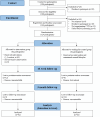Effectiveness of a WeChat Mini Program-Based Intervention on Promoting Multiple Health Behavior Changes Among Chinese Patients With Cardiovascular Diseases in Home-Based Rehabilitation: Randomized Controlled Trial
- PMID: 40460318
- PMCID: PMC12151454
- DOI: 10.2196/66249
Effectiveness of a WeChat Mini Program-Based Intervention on Promoting Multiple Health Behavior Changes Among Chinese Patients With Cardiovascular Diseases in Home-Based Rehabilitation: Randomized Controlled Trial
Abstract
Background: WeChat mini program-based interventions grounded in behavior change theories show promise in promoting and maintaining healthy lifestyles among patients with cardiovascular diseases (CVDs) after hospital discharge. However, limited randomized controlled trials have evaluated the effectiveness of such interventions among Chinese patients with CVDs in a home-based rehabilitation context.
Objective: This study aimed to assess the effectiveness of a 10-week WeChat mini program-based intervention on multiple health behaviors, including moderate to vigorous physical activity (MVPA), fruit and vegetable consumption (FVC), integrated lifestyle indicator (ie, meeting both MVPA and FVC recommendations), psychosocial resources (intrinsic and extrinsic) of behavior change, and health-related outcomes (ie, depressive symptoms and perceived quality of life) among Chinese patients with CVDs.
Methods: This study recruited 166 outpatients from a cardiac rehabilitation center in China. After screening for eligibility and randomization, 124 participants (mean age 41.60, SD 13.48 years; 61.3% female) were allocated to either (1) the intervention group, which received a 10-week health program based on the Health Action Process Approach, or (2) a waitlist control group, which received no intervention and maintained their usual lifestyle. Both groups completed assessments at baseline, postintervention (10 weeks), and 3 months postintervention. Data were analyzed using generalized linear mixed models in IBM SPSS 28.0.
Results: Significant time-by-group interaction effects were observed for MVPA (F2, 122=6.68; P=.002), FVC (F2, 122=18.68; P<.001), integrated lifestyle indicator (F2, 122=13.83; P<.001), intrinsic (F2, 122=11.49; P<.001) and extrinsic psychosocial resources (F2,1 22=5.35; P=.006) for MVPA, intrinsic resources for FVC (F2, 122=12.66; P<.001), and perceived quality of life (F2, 122=6.99; P=.001). The intervention group showed significant improvements in these outcomes compared to the control group, with medium-to-large effect sizes for behavior-related outcomes (d=0.57-0.88), and small-to-medium effect sizes for psychosocial and health-related outcomes (d=0.28-0.52). However, no significant effects were found for extrinsic resource for FVC (F2, 122=1.37; P=.26) or depressive symptoms (F2, 122=0.44; P=.64). Sensitivity analyses confirmed the robustness of the primary findings.
Conclusions: The 10-week Healthy Action Process Approach-based WeChat mini program intervention effectively improved MVPA, FVC, integrated lifestyle indicator, psychosocial resources of behavior change, and health-related outcomes among Chinese patients with CVDs. This intervention provides a valuable addition to rehabilitation strategies aimed at promoting long-term health and activity in cardiac patients following hospital discharge.
Keywords: CVD; China; HAPA; Health Action Process Approach; WeChat; behavioral theories; cardiac rehabilitation; cardiovascular; cardiovascular disease; digital health; domiciliary rehabilitation; health behavior; health behavior change; healthy lifestyle; home-based rehabilitation; intervention; multiple health behavior change; nutrition; physical activity; randomized controlled trial.
© Yanping Duan, Wei Liang, Lan Guo, Huimin Zhan, Chunli Xia, Huan Ma, Borui Shang, Yanping Wang, Min Yang, Shishi Cheng. Originally published in the Journal of Medical Internet Research (https://www.jmir.org).
Conflict of interest statement
Figures


References
-
- China’s CVDs Organization Overview of report on cardiovascular health and diseases in China 2022. CJIC. 2023;21(7):577–600. doi: 10.3969/j.issn.1672-5301.2023.07.001. doi. - DOI
Publication types
MeSH terms
Supplementary concepts
LinkOut - more resources
Full Text Sources
Medical
Miscellaneous

